Alienware x14
MSRP $1,199.00
“The Alienware x14 takes the concept of a compact laptop further than ever before.”
pros
-
Incredibly thin
-
Lots of ports in back
-
Solid performance
-
Excellent build quality
-
Comfortable keyboard
cons
-
Limited to RTX 3060
-
Wrist rests are too small
-
Thick, plastic bezels
Competition for the lightest and thinnest gaming laptop has never been tighter. But Alienware has taken the crown with the Alienware x14, which defies anything that has come before it in size, including options like the Razer Blade 14 or ROG Zephyrus G14.
It’s clear the Alienware x14 does something no other gaming laptop can do. The only problem? The amount of people that would trade a few millimeters for higher frame rates might be smaller than Alienware thinks.
specs
| Alienware x14 | |
| Dimension | 12.66 inches x 10.35 inches x 0.57 inches |
| weight | 3.96 pounds (up to 4.06) |
| processor | Intel Core i7-12700H Intel Core i7-12900H |
| Graphics | Nvidia RTX 3050 4GB Nvidia RTX 3050 Ti 4GB Nvidia RTX 3060 6GB |
| R.A.M. | 16GB 4800MHz 16GB or 4800MHz, 5200MHz (with RTX 3060), 32GB 5200MHz (with RTX 3060) |
| screen | 14.0-inch FHD (1920 x 1080), 144Hz 7ms, G-Sync, Advanced Optimus |
| Storage | 256GB, 512GB, 1TB, 2TB |
| Wireless | WiFi 6E and Bluetooth 5.2 |
| cam | 720p, Windows Hello IR webcam |
| operating system | Windows 11 Home or Pro |
| batteries | 80 watt hour |
| Price | $1,199+ |
Insanely thin and light
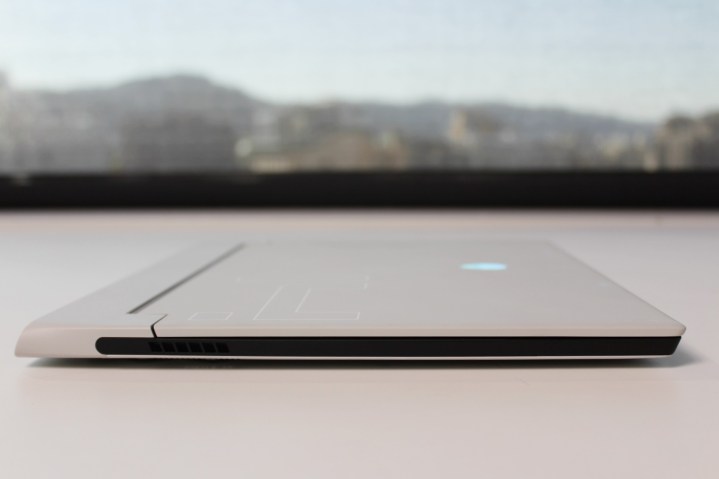
The Alienware x14 isn’t just light. It’s tiny. The chassis is just 0.57 inches thick, which is as thin as the Surface Laptop 4. And remember: this is a gaming laptop. Considering the graphics card this thing has inside, that’s quite an achievement. Taking it from room to room is a breeze, as is tossing it in your bag. The size certainly comes with some compromises, but that doesn’t make this cutting-edge design any less of an engineering marvel.
What are the compromises for a gaming laptop this thin? Well, your mind probably goes to performance first, as did mine. The idea that the Alienware x14 could actually produce some decent gaming performance seems downright impossible considering how thin it is. But it handled its powerful components better than I thought it would.
It has an RTX 3060 under the hood, as well as an Intel Core i7-12900H. This is the maxed-out configuration, which comes in at $1,750 and also includes 16GB of LPDDR5 and a 1TB SSD. Normally, I’d consider these decent specs for a gaming laptop, especially in the midrange territory.
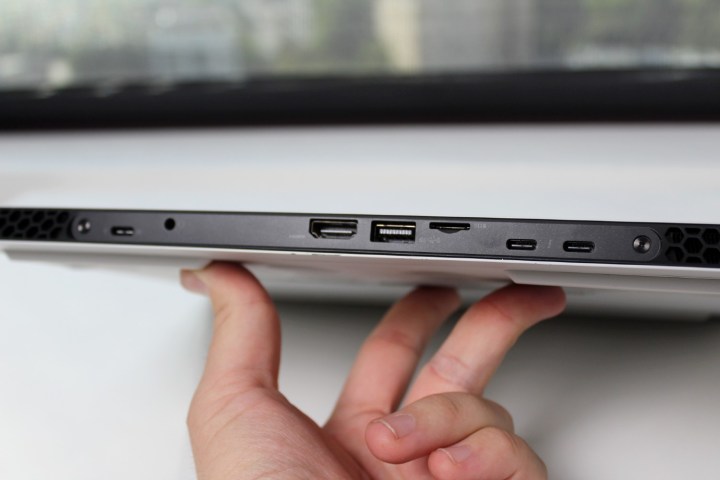
But the Alienware x14 is no budget laptop. It still comes in at $150 cheaper than the Razer Blade 14, but the price, design, and build quality all scream “premium.” That’s makes the range of GPU options disappointing. Paying $1,400 for a measly RTX 3050 feels like quite a stretch.
And there’s an important reason why the Alienware x14 is limited to just the RTX 3060: the ports. Instead of a conventional barrel charger, the Alienware x14 is powered by just a single USB-C port. When it comes to dedicated gaming laptops, that’s a first. On one hand, it’s convenient for those of us who love the universality of USB-C. But it does mean an RTX 3070 Ti or 3080 Ti is off the table.
Like the rest of the ports, the USB-C port is located in the back, leaving only some vents along the sides of the chassis. While the offering of ports is everything you could need, the positioning of the headphone jack in the back feels inconvenient. It’s a little cumbersome to run your wired headphones to the back, especially since it can easily get caught in the hinge. I can’t complain about the clean edges, though – it gives the device a very sleek look.
Good performance, with a caveat
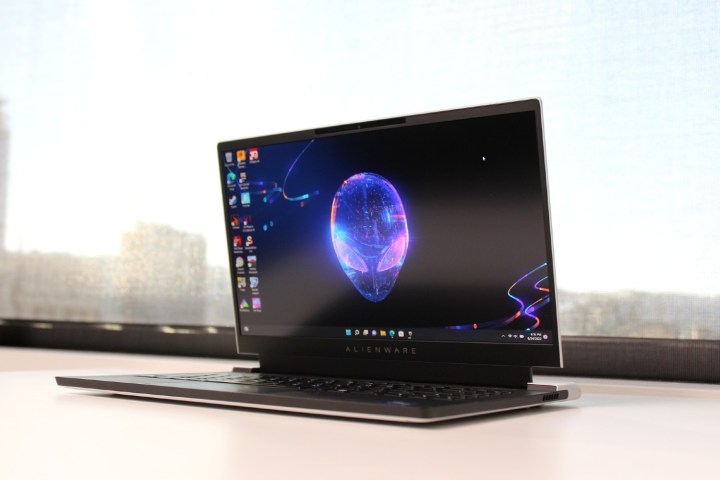
If you get the RTX 3060 model, you’ll get just enough gaming performance to make it worth the money. In 3DMark Time Spy, the Alienware x14 is actually the best-scoring laptop with the RTX 3060 we’ve tested, including the HP Victus 16, Dell XPS 17, Lenovo ThinkPad X1 Extreme Gen 4.
That’s a good sign, but there’s a reason this laptop only comes with a 1080p screen. Even at that resolution, you can only expect lighter games like Civilization VI to get over 60 frames per second (fps). Meanwhile, heavier games like Assassin’s Creed Valhalla and Red Dead Redemption 2 land right around 60 fps. These games still look and play well, mind you, just not enough to take full use of the 144Hz display.
Fortnite is an example of the kind of game the Alienware x14 was made for. It runs at an average of 72 fps at Epic settings. Want even more speed? Move the settings down to High and you’ll get frame rates as high as 89 fps — all without losing too much graphical fidelity.
| Alienware x14
(RTX 3060) |
Razer Blade 14
(RTX 3070) |
Predator Triton 300 SE
(RTX 3060) |
|
| 3DMark Time Spy | 7662 | 8605 | 6038 |
| Civilization VI | 117 fps | 111 fps | 84 fps |
| Fortnite | 72 fps | 96 fps | 78 fps |
| Assassin’s Creed Valhalla | 60 fps | 60 fps | 50 fps |
| Red Dead Redemption 2 | 56 fps | n / A | n / A |
We don’t have another gaming laptop with the exact specs as the Alienware x14. The Triton 300 SE is a similar laptop, but the last one we tested was an Intel 11th-gen model, which explains some of the lower performance in CPU-dependent games like Civilization VI and Assassin’s Creed Valhalla. Compared to non-gaming laptops like the Dell XPS 17 or the Asus Zenbook Pro 16X with the same graphics, the Alienware x14 is a better performer in games.
And thanks to the quality of the Alienware x14’s panel, games and other media really do look sharp. It’s a very colorful screen, hitting 91% of the AdobeRGB color gamut. It’s also an expertly calibrated screen, with a Delta-E of just 0.6. This is one of the best 1080p panels I’ve ever tested, so kudos to Alienware for going above and beyond.
The Alienware x14 performs well in non-gaming scenarios.
Still, playing games on a higher-resolution screen is certainly preferable, especially in games that emphasize the richness of the visuals. The 1440p 165Hz screen on the Razer Blade 14 is the more impressive gaming experience, but it’ll cost you $2,600. That’s hardly a fair comparison to the Alienware x14, which comes in under $2,000, even with a maxed-out configuration.
The Alienware x14 performs well in non-gaming scenarios too. My review unit used the Core i7-12700H, paired with an unnecessary 32GB of RAM and 1TB of storage. During taxing workflows, the fans ramp up fast, even in the default Balanced thermal setting. The result is a lot of fan noise, but impressive CPU performance. It’s only around 8% slower than the Dell XPS 17 in tasks like video encoding. Buy the Alienware x14 to game on, but if you have some side projects that involve the Adobe Creative Suite, the performance of this laptop won’t get in the way.
Odds and ends
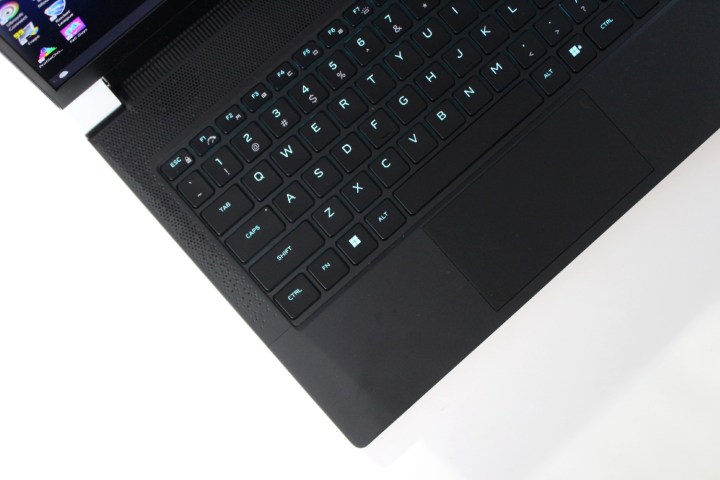
You likely want to use the Alienware x14 for more than just games, and fortunately, it’s a well-made, thoughtful design for getting work done too.
There are some small usability things to mention about the Alienware x14. First, it has an excellent keyboard, both for typing and gaming. Keypresses feel tight and precise, and the keycaps don’t wiggle. I appreciate having media buttons separated over on the right of the layout too. The RGB lighting is a bit lackluster throughout though, with just single-zone backlighting on the keyboard and nothing on the ring around the vents in the back. This doesn’t bother me, but if you want more customizable lighting, you’ll want to opt for the Alienware x15 or x17.
Opting for a 16:10 aspect ratio screen would have shrunk the bezels down.
The touchpad works well, but I had some issues with palm rejection from time to time. It’s a little small too, as are the palm rests. Moving the keyboard and touchpad away from the hinge allows for better cooling of the components underneath, but they make for an uncomfortable place to put your wrist.
The 720p webcam isn’t the best, but the inclusion of a Windows Hello IR camera is a fantastic feature that’s still uncommon in gaming laptops. Speaking of the webcam, the Alienware x14 has some fairly tacky-looking plastic bezels that frame the outside of the screen. The bottom bezel is particularly large — and it’s a bit of an eyesore. Opting for a 16:10 aspect ratio screen would have solved this problem, which is what laptops like the Predator Triton 300 SE have.
Battery life is nothing to write home about. Like many gaming laptops, it’ll last around five hours on a very light load, and only a few if you have a more involved multitasking setup going. Likely thanks to the use of its AMD processor, the Razer Blade 14 is the only competitor that’ll last around three more hours than the Alienware x14 on a single charge.
It’s impressive, but it’s not for everyone
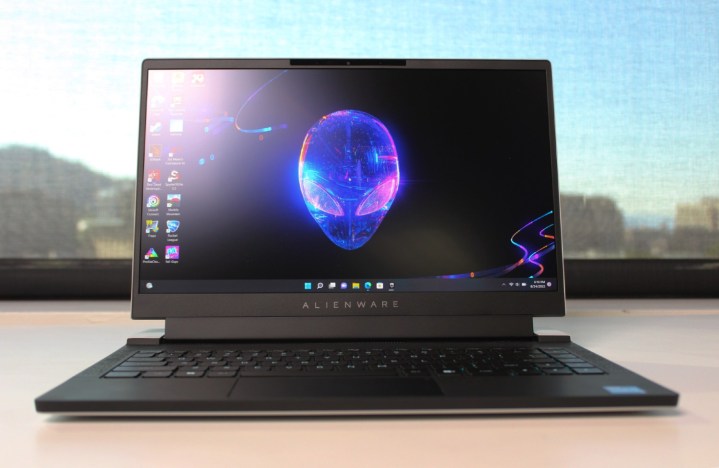
Alienware made the best possible gaming laptop it could at this size. It didn’t come without some compromises, of course, but as long as you buy a higher-end configuration, you’ll still get decent gaming performance. If you care more about higher frame rates than size though, you’ll find a better balance in laptops like the ROG Zephyrus G14 or Razer Blade 14 — both of which are still quite small compared to the average gaming laptop.
The Razer Blade 14 has more on offer with its cleaner design, more extensive GPU options, and better battery life. To me, that’s worth the extra $150.
But for those that will love the extreme portability the Alienware x14 affords, you’ll be impressed by what this little thing can do. Just make sure to at least opt for the RTX 3060 model.
Editors’ Recommendations
